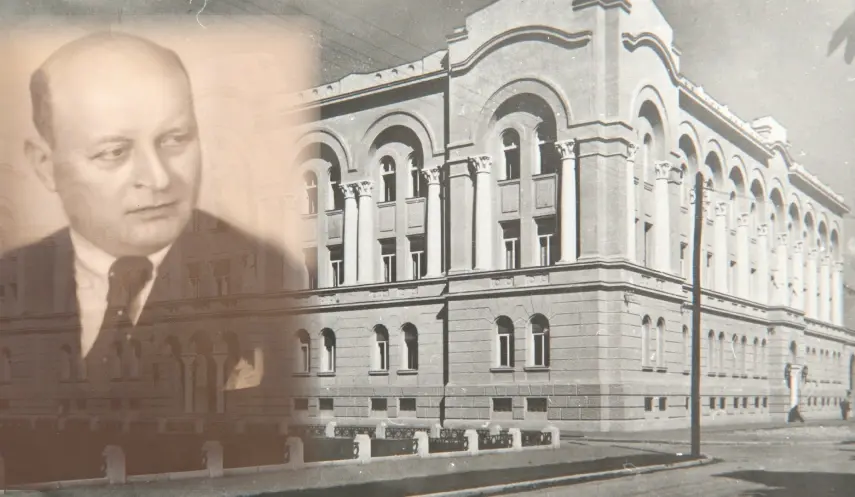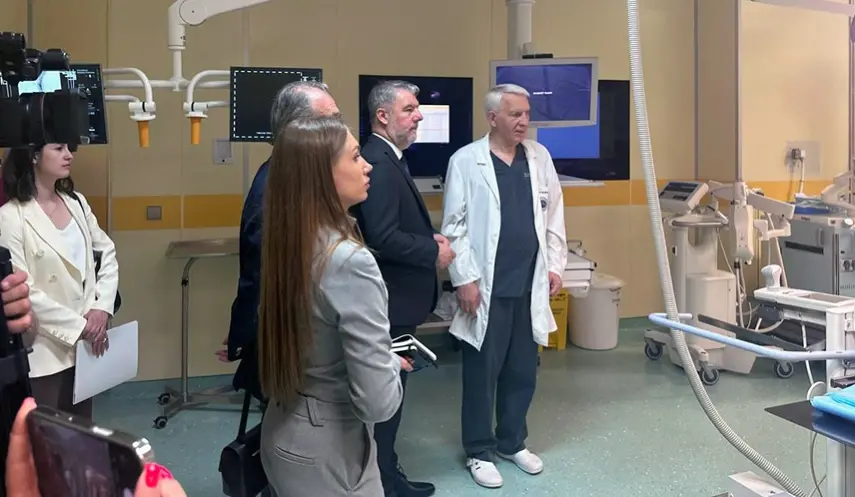VRBAS BANAT - LAND OF ROMANCE
Republika Srpska - Banja Luka - sights /1/
06/02/2025
10:00

BANJA LUKA, JUNE 2 /SRNA/ - The Banski Dvor /Ban's Palace/ building in Banja Luka is one of the city's trademarks, which, once the center of the Vrbas Banat, is now a place that intrigues and arouses curiosity to discover what is hidden behind its walls, both for the local population and for tourists.
"Land of Romance," this is how the Vrbas Banat was called in a tourist and travel text from 1937. The newspaper Razvitak wrote about tourism in this, one of the nine banates, the then administrative regions of the Kingdom of Yugoslavia, with its headquarters in Banja Luka.
The Vrbas Banat, according to the travel writer A. Dekaris, is rich and endowed with natural beauty, and in terms of "the composition and diversity of the terrain, folk costumes and customs, oriental features and historical monuments, it represents a land of romance, which seems to have been created to attract visitors eager to see the natural beauty and peculiarities of the population."
The author of the text, among other things, states that many times, "during his stay in the most civilized countries of Europe," he became convinced that "individuals, educated by books and newspaper reports, had quite strange, completely inaccurate and unclear ideas about our country and people, as well as other, especially Balkan countries and peoples".
One of the trademarks of Banja Luka is the Banski Dvor building. Bans Svetislav Milosavljević, Dragoslav Đorđević, and Bogoljub Kujundžić, worked and lived in its chambers, and most recently it was home to the Ban Todor Lazarević's family, whose descendants still live in Banja Luka today.
Nadežda Lazarević-Kovačević, the only granddaughter of the only Krajišnik Ban, Dr Todor Lazarević, decided to dust off that golden, civic part of Banja Luka's history.
In this mission of sorts, she had the selfless help of her husband Dragan Kovačević, who heads the Foundation "Dr Todor Lazarević, Ban of the Vrbas Banat". They designed and, in cooperation with the Ban's Palace, realized the permanent exhibition "Vrbas Banat: Traces, Outlines, Echoes," within which thematic exhibitions are also organized.
"This exhibition is the idea and realization of my husband's dream, and I was only a reliable team assistant", emphasizes Lazarević-Kovačević for SRNA.
The nucleus of the exhibition is the family legacy of the fourth Ban of the Vrbas Banate and the families with whom he was related: Dobraš, Miljević, Šoštarić, Dušanić, Petrović.
As a crowning achievement of his national and political struggle for the welfare of the people, and especially of his people of Krajina, Dr Todor Lazarević was awarded one of the highest honors in the Kingdom of Yugoslavia - the position of the first man of one of the nine banats who was responsible only to the king.
In July 1908, Lazarević received an index from the Vienna Faculty of Law and became visible and prominent in advanced academic circles. He published works in the newspaper Otadžbina, by the famous Petar Kočić, in Bosanska Vila and Srpska Vila, in Brankovo Kolo and the Vienna Srpska Zora.
And although proud of his education and the title of Doctor of Laws obtained at the University of Vienna, when he became a father, he often told his son - Predrag Gugo Lazarević: "You will study in Paris, Vienna is, after all, the periphery of Europe".
Todor Lazarević spent the Great War working as a judge in Sarajevo, Derventa, Zenica, Foča and Tomislavgrad, and the president of the court was in the then Bosanski Novi, happy that in this way he avoided serving in the occupying army of the Austro-Hungarian Monarchy, which allowed him to provide moral support to the Serbian army from behind the scenes.
He began his career as a lawyer in Banja Luka, all the while actively participating in political life, and was elected as a member of the Kingdom's parliament on three occasions. As the undisputed leader of Krajina, who enjoyed the respect not only of Serbs, but also of Croats and Muslims, he received numerous decorations.
"The area that was encompassed by the Vrbas Banovina was abused by the occupiers for centuries. According to Vasa Pelagić, `Turkey killed the body, and Austria-Hungary killed both the body and the soul.` Even after the liberation in 1918, it was neglected by the local authorities," Nadežda Lazarević-Kovačević told SRNA.
She states that the Vrbas Banat entered the Kingdom of Yugoslavia as the most underdeveloped in all segments of life. And only then, with the support of the agile and honest first ban - Svetislav Tisa Milosavljević, did its inhabitants get and use the opportunity to show what they know and can do.
"All prominent people, among whom merchants were foremost, considered it an honor and a duty to help and invest in the development of their community, and not, as today, to just expect to receive something from it.
In a developed civil society that is being formed, individualism, as one of its important characteristics, is especially expressed in the formation of its nucleus - the family. Although with a pronounced peculiarity and originality, this civil family respects its culture and tradition, but also tolerates and appreciates other people's and different ways of life," says Lazarević-Kovačević.
Unfortunately, she points out, that period was too short, in historical proportions - just a moment, but it left an indelible mark, because we are still proud of the achievements of that time.
"However, this and such a way has been marginalized for a number of socio-historical reasons. Family and war tragedies, refugees, population migrations, as well as events related to the establishment of the post-war value system have interrupted the continuity of development and the preservation of this layer of society as the bearer of development.
And, it has increasingly led to the devastation of rural areas, which has caused an increasing drop in the birth rate, as one of the greatest scourges of today," Nadežda Lazarević-Kovačević told SRNA. /to be continued/

GOLDSCHMIDT: STILL WAITING FOR APOLOGY FROM BiH AUTHORITIES

POSSIBLE COOPERATION BETWEEN ALMAZOV RESEARCH CENTRE AND UNIVERSITY CLINICAL CENTRE

SARAJEVO "TROIKA" WANTS TO WEAKEN SNSD - THE BIGGEST OBSTACLE TO UNITARY BiH



